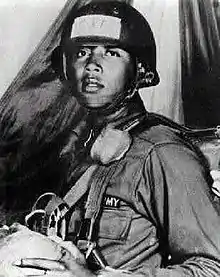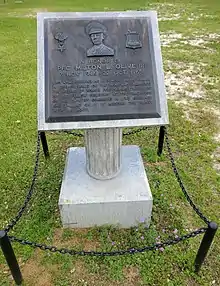Milton L. Olive III
Milton Lee Olive III (November 7, 1946 – October 22, 1965) was a United States Army soldier and a recipient of America's highest military decoration — the Medal of Honor — for his actions in the Vietnam War. At the age of 18, Olive sacrificed his life to save others by falling on a grenade. He was the first African-American recipient of the Medal of Honor from the Vietnam War.[1]
Milton Lee Olive III | |
|---|---|
 Private First Class Milton L. Olive III | |
| Born | November 7, 1946 Chicago, Illinois |
| Died | October 22, 1965 (aged 18) Phu Cuong, South Vietnam |
| Place of burial | West Grove Missionary Baptist Church Cemetery, Lexington, Mississippi |
| Allegiance | United States of America |
| Service/ | United States Army |
| Years of service | 1964 - 1965 |
| Rank | Private First Class |
| Unit | Company B, 2nd Battalion, 503rd Infantry Regiment, 173rd Airborne Brigade |
| Battles/wars | Vietnam War † |
| Awards | Medal of Honor Purple Heart |
Biography
Olive joined the Army from his birth city of Chicago, Illinois in 1964,[2] and by 1965 was serving as a Private First Class in Company B of the 2nd Battalion (Airborne), 503rd Infantry Regiment, 173rd Airborne Brigade in Vietnam. On October 22, 1965, while moving through the jungle with four fellow soldiers in Phu Cuong, Olive sacrificed his life by smothering an enemy-thrown grenade with his body. For his actions on that day, he was posthumously awarded the Medal of Honor.
At a ceremony on the steps of the White House, on April 21, 1966, President Lyndon B. Johnson presented Olive's Medal of Honor to his father and stepmother. Also in attendance were two of the four men whose lives were saved by Olive's actions.
Olive's body was returned to the United States and buried in West Grove Cemetery at Lexington, Holmes County, Mississippi. Olive was born in Chicago but left as a young boy living in Lexington, Mississippi where he finished high school.
Tributes

In 1966 a plaque and park was dedicated in his honor.[3] In 1999, the city of Chicago recognized Olive by naming Olive Park on Lake Michigan in his honor.[1] Olive-Harvey College, one of the City Colleges of Chicago, is named after both Olive and fellow Medal of Honor recipient Carmel Bernon Harvey Jr.. The Milton L. Olive Middle School in Wyandanch, Long Island, New York, is also named in his honor. In 2007, a State Historical Marker was erected for Olive in Lexington, Mississippi. The dedication ceremonies included an address by the Adjutant General of the Mississippi National Guard. Fort Campbell has a recreation facility named in his honor. In 2012, Fort Benning, GA dedicated a Simulations facility in his honor named Olive Hall (The Maneuver Battle Lab).
Honor Field is a one-mile track located in Ft. Polk LA that bears a plaque detailing Olives heroics.[4] The field is used for everything from changes of command and physical training to tests of physical fortitude in various military competitions.

The Downlow Saga, a 2017 novel by Los Angeles author Sheldon McCormick, is dedicated in memory of PFC Olive.
His statue, along with Sgt. William Harvey Carney, is seen on the African-American Medal of Honor Recipients Memorial in Wilmington, Delaware.[5]
In the 2020 Spike Lee film Da 5 Bloods, Olive is briefly mentioned during a conversation about portrayals of war in Hollywood, with the character Otis wishing for the portrayals of more black war heroes like Olive. [6]
Medal of Honor citation

For conspicuous gallantry and intrepidity at the risk of his life above and beyond the call of duty. Pfc. Olive was a member of the 3d Platoon of Company B, as it moved through the jungle to find the Viet Cong operating in the area. Although the platoon was subjected to a heavy volume of enemy gunfire and pinned down temporarily, it retaliated by assaulting the Viet Cong positions, causing the enemy to flee. As the platoon pursued the insurgents, Pfc. Olive and 4 other soldiers were moving through the jungle together when a grenade was thrown into their midst. Pfc. Olive saw the grenade, and then saved the lives of his fellow soldiers at the sacrifice of his own by grabbing the grenade in his hand and falling on it to absorb the blast with his body. Through his bravery, unhesitating actions, and complete disregard for his safety, he prevented additional loss of life or injury to the members of his platoon. Pfc. Olive's extraordinary heroism, at the cost of his life above and beyond the call of duty, are in the highest traditions of the U.S. Army and reflect great credit upon himself and the Armed Forces of his country.[7]
See also
Notes
- Mohr, 2007.
- Service Profile
- Big Picture: Your Army Reports: Number 5. U.S. Army Audiovisual Center. 1966. Retrieved February 20, 2012.
- "Milton Olive III". Fort Polk Guardian. Fort Polk Guardian. Retrieved 2 August 2018.
- "African American Medal of Honor Recipients Memorial Historical Marker". Retrieved 2018-11-23.
- "'Da 5 Bloods': Five black military men who could have inspired the characters in Spike Lee's new film". The National: International. Razmig Bedirian. 2020-06-15. Retrieved 2020-09-08.
- "Vietnam War Medal of Honor recipients (M-Z)". Medal of Honor citations. United States Army Center of Military History. 2003-10-03. Retrieved 2006-11-14.
References
 This article incorporates public domain material from websites or documents of the United States Army Center of Military History.
This article incorporates public domain material from websites or documents of the United States Army Center of Military History.
- "Remarks Upon Presenting the Medal of Honor (Posthumous) to the Father of Milton L. Olive III". The American Presidency Project. University of California, Santa Barbara. Retrieved 2006-11-14.
- Holbrook Mohr (Associated Press) (March 31, 2007). "Ceremony will honor Medal of Honor recipient". Marine Corps Times. Archived from the original on September 30, 2007. Retrieved 2007-03-31.
External links
- "Interactive Vietnam Veterans Memorial". Retrieved October 4, 2010.
- The short film STAFF FILM REPORT 66-19A (1966) is available for free download at the Internet Archive
- https://commons.wikimedia.org/wiki/File:Milton_L._Olive_III_plaque_detailing_his_heroic_actions_in_WW_2.jpg